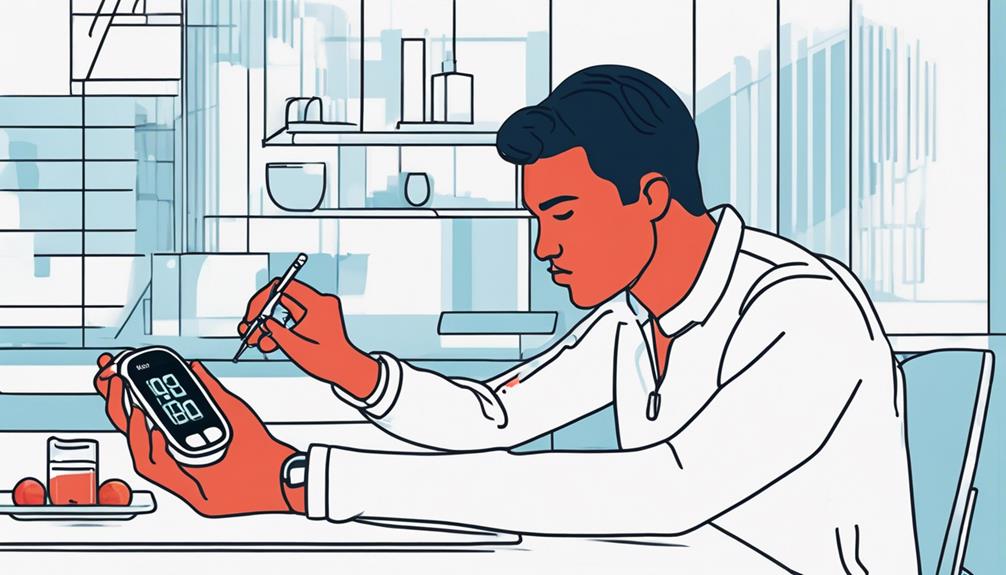In today's fast-paced world, managing your diabetes can be a challenging task, but with consistent glucose monitoring, you can take charge of your health.
By understanding the importance of regular monitoring and utilizing various glucose testing devices, you can make informed decisions about your daily routines and diet.
However, the key to successfully managing diabetes lies not just in checking your blood sugar levels frequently but also in knowing how to interpret the results and make necessary adjustments.
By implementing changes based on your readings, you can better control your diabetes and improve your overall well-being.
Key Takeaways
- Regular glucose monitoring is vital for effective diabetes management.
- Analyze patterns to make informed decisions on lifestyle adjustments.
- Proactive monitoring aids in preventing complications and understanding body responses.
- Consistent monitoring empowers individuals to manage blood sugar levels effectively.
Importance of Regular Monitoring

Regular monitoring of glucose levels is crucial for effectively managing diabetes. Consistency in monitoring helps individuals with diabetes understand their blood sugar variations throughout the day, enabling them to make informed decisions about their diet, exercise, and medication.
Research consistently shows that regular monitoring is directly linked to improved health outcomes for people with diabetes. By tracking glucose levels consistently, individuals can identify patterns, such as how different foods affect their blood sugar or the impact of stress on their levels. This information is invaluable for healthcare providers in adjusting treatment plans and medications to better control diabetes.
Moreover, consistent monitoring empowers individuals to take an active role in their health, leading to better overall well-being. Understanding the importance of monitoring consistency and its impact on health outcomes is a significant step towards effectively managing diabetes and living a fulfilling life.
Types of Glucose Testing Devices
Various glucose testing devices are available to help individuals with diabetes monitor their blood sugar levels effectively. When choosing a device, consider factors like ease of use, accuracy, and convenience.
Here are four types of glucose testing devices to consider:
- Blood Glucose Meters: These are portable devices that require a small blood sample for testing. They're commonly used for self-monitoring at home.
- Continuous Glucose Monitoring Systems (CGMs): These systems provide real-time glucose readings throughout the day, offering a more comprehensive view of blood sugar trends. They consist of a sensor placed under the skin that automatically measures glucose levels.
- Flash Glucose Monitoring: This type of monitoring involves a sensor worn on the skin that continuously measures glucose levels. Users can scan the sensor with a reader to obtain glucose readings without needing to prick their fingers.
- Alternative Methods: Some newer technologies are emerging, such as non-invasive glucose monitoring devices that measure blood sugar levels without the need for finger pricks. These alternative methods offer more comfort and convenience to users seeking continuous monitoring options.
Frequency of Blood Sugar Checks

To effectively manage your diabetes, it's essential to determine the appropriate frequency for checking your blood sugar levels. The monitoring schedule for blood sugar checks can vary depending on individual circumstances. Some individuals may need to check their levels multiple times a day, especially if they're on insulin therapy or have trouble maintaining stable blood sugar levels. Others may only need to check once or twice a day. It's crucial to work with your healthcare provider to establish a monitoring schedule that fits your specific needs and lifestyle.
Tracking your blood sugar trends and habits is vital in understanding how your body responds to different foods, activities, and medications. By monitoring your blood sugar levels regularly, you can identify patterns and make necessary lifestyle adjustments to better manage your diabetes. Consistent monitoring allows you to take proactive steps to keep your blood sugar levels within a healthy range and prevent complications associated with diabetes. Remember, staying informed and actively participating in your diabetes management can lead to better overall health and well-being.
Interpreting Glucose Monitoring Results
Understanding the significance of your blood sugar monitoring results is crucial for effectively managing your diabetes and making informed decisions about your health. When interpreting your glucose monitoring data, consider the following key points:
- Trend Analysis: Look for patterns in your blood sugar levels throughout the day. Identifying consistent trends can help you understand how your body responds to different activities, medications, and meals.
- Meal Impact: Pay close attention to how your blood sugar levels change after eating. By tracking these responses, you can adjust your meal choices and portion sizes to better control your glucose levels.
- Time of Day: Note any fluctuations that occur at specific times. This information can guide you in timing your meals, medications, and physical activity to maintain stable blood sugar levels.
- Exercise Effects: Monitor how exercise influences your blood sugar readings. Understanding the impact of physical activity can help you prevent sudden spikes or drops in glucose levels.
Implementing Changes Based on Readings

When adapting your lifestyle based on your glucose monitoring readings, it's essential to analyze trends and patterns to make informed decisions about managing your diabetes effectively. Making adjustments to your daily routine can significantly impact your blood sugar levels. By closely monitoring your glucose readings, you can identify specific triggers that cause spikes or drops in your blood sugar. For example, if you notice that certain foods consistently lead to high glucose levels, you can make lifestyle modifications such as reducing the intake of those foods or adjusting your meal timings.
Moreover, implementing changes based on your readings involves more than just diet adjustments. It may also include incorporating regular physical activity into your routine, ensuring you get enough sleep, and managing stress levels effectively. By paying attention to how these factors influence your glucose levels, you can tailor your lifestyle to better control your diabetes. Remember that consistency is key when making lifestyle modifications, as small changes over time can lead to significant improvements in your overall health.
Frequently Asked Questions
Are There Specific Times During the Day When Glucose Monitoring Is More Crucial for Managing Diabetes Effectively?
Monitoring your glucose levels at specific times each day is crucial for managing diabetes effectively. Especially focus on checking post-meal levels to adjust your diet and medication. Additionally, monitoring morning and evening routines helps maintain stable blood sugar levels.
How Can Stress and Other Emotional Factors Impact Blood Sugar Levels, and How Should This Be Taken Into Account When Monitoring Glucose Levels?
When dealing with stress and emotions, remember their impact on blood sugar levels. Monitor regularly to catch fluctuations. Practice stress management techniques like deep breathing or meditation. Stay aware of how emotional well-being affects glucose control.
Are There Any Alternative Methods or Technologies Available for Tracking Blood Sugar Levels Aside From Traditional Glucose Testing Devices?
For tracking blood sugar levels beyond traditional methods, consider continuous monitoring through wearable technology. These devices offer real-time data, enhancing your understanding of glucose trends and helping manage diabetes more effectively with convenience and precision.
How Can Individuals With Diabetes Ensure Accurate and Consistent Glucose Monitoring While Traveling or During Periods of Significant Lifestyle Changes?
When traveling or experiencing lifestyle shifts, maintain precise glucose monitoring. Utilize travel tips for consistent readings. Embrace changes with adaptable monitoring techniques. Your health is your compass; navigate it with diligence and flexibility.
Are There Any Common Mistakes or Misconceptions That People Often Have About Glucose Monitoring That Could Impact Their Ability to Effectively Manage Their Diabetes?
Common misconceptions about glucose monitoring include underestimating the impact of inaccurate readings, neglecting the frequency of monitoring, and assuming all devices are foolproof. Such errors can significantly hinder your ability to effectively manage diabetes.
Conclusion
In conclusion, consistent glucose monitoring is crucial for managing diabetes effectively. By regularly checking your blood sugar levels with the right devices, you can stay on top of your health and make informed decisions about your diet and medication.
Remember, monitoring your glucose levels frequently, interpreting the results accurately, and implementing necessary changes promptly can help you maintain stable blood sugar levels and prevent complications. Stay proactive, stay healthy!